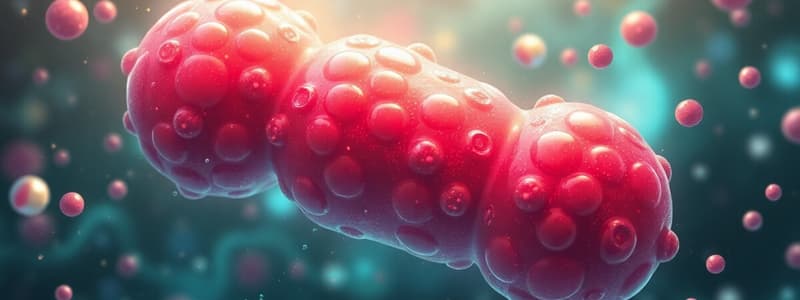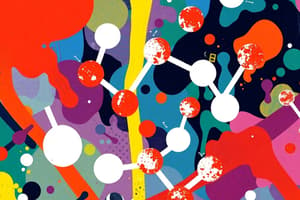Podcast
Questions and Answers
The drug dapagliflozin is an example of an ______ inhibitor.
The drug dapagliflozin is an example of an ______ inhibitor.
SGLT2
Frusemide is a type of ______ diuretic that acts in the loop of Henle.
Frusemide is a type of ______ diuretic that acts in the loop of Henle.
loop
Hydrochlorothiazide is a ______ diuretic, known for its potassium-depleting effect.
Hydrochlorothiazide is a ______ diuretic, known for its potassium-depleting effect.
thiazide
______ is a hormone that stimulates red blood cell production.
______ is a hormone that stimulates red blood cell production.
Albumin is a type of ______ that increases osmotic pressure.
Albumin is a type of ______ that increases osmotic pressure.
______ is an electrolyte that maintains muscle and nerve function.
______ is an electrolyte that maintains muscle and nerve function.
Normal saline (NS 0.9%) is an example of a ______ solution.
Normal saline (NS 0.9%) is an example of a ______ solution.
Mannitol is a type of ______ that alters osmosis and reduces intracranial pressure.
Mannitol is a type of ______ that alters osmosis and reduces intracranial pressure.
Naloxone is an opioid ______ that blocks effects at mu opioid receptors.
Naloxone is an opioid ______ that blocks effects at mu opioid receptors.
Sodium Valproate is used for seizures, epilepsy, and ______.
Sodium Valproate is used for seizures, epilepsy, and ______.
Levodopa is converted to ______ in the brain and is used for Parkinson's disease.
Levodopa is converted to ______ in the brain and is used for Parkinson's disease.
Ranitidine acts as an H2 receptor ______ to inhibit gastric acid production.
Ranitidine acts as an H2 receptor ______ to inhibit gastric acid production.
Metformin is a ______ that reduces liver glucose production and increases insulin sensitivity.
Metformin is a ______ that reduces liver glucose production and increases insulin sensitivity.
Loperamide is an anti-______ medication that activates opioid receptors in the gut.
Loperamide is an anti-______ medication that activates opioid receptors in the gut.
Sulfonylureas like Glipizide increase ______ secretion to manage Type 2 Diabetes Mellitus.
Sulfonylureas like Glipizide increase ______ secretion to manage Type 2 Diabetes Mellitus.
Flashcards
What is a SGLT2 inhibitor?
What is a SGLT2 inhibitor?
A type of medication that lowers blood sugar by preventing the kidneys from reabsorbing glucose back into the bloodstream.
What is a loop diuretic?
What is a loop diuretic?
A medication like Frusemide that acts in the loop of Henle to increase urine output by blocking sodium reabsorption.
What is a thiazide diuretic?
What is a thiazide diuretic?
A type of diuretic like Hydrochlorothiazide that works in the distal tubule to increase urine output and can cause potassium loss.
What is the function of Erythropoietin?
What is the function of Erythropoietin?
Signup and view all the flashcards
What is the role of potassium in the body?
What is the role of potassium in the body?
Signup and view all the flashcards
What are crystalloid solutions used for?
What are crystalloid solutions used for?
Signup and view all the flashcards
How do hypertonic solutions work?
How do hypertonic solutions work?
Signup and view all the flashcards
What is a diuretic like mannitol used for?
What is a diuretic like mannitol used for?
Signup and view all the flashcards
What is the mechanism of action of naloxone?
What is the mechanism of action of naloxone?
Signup and view all the flashcards
What is the mechanism of action of Sodium Valproate (Epilim)?
What is the mechanism of action of Sodium Valproate (Epilim)?
Signup and view all the flashcards
What are insulin medications used for?
What are insulin medications used for?
Signup and view all the flashcards
What is the mechanism of action of Metformin?
What is the mechanism of action of Metformin?
Signup and view all the flashcards
What is the mechanism of action of Sulfonylureas like Glipizide?
What is the mechanism of action of Sulfonylureas like Glipizide?
Signup and view all the flashcards
What is the mechanism of action of Midazolam?
What is the mechanism of action of Midazolam?
Signup and view all the flashcards
What is the mechanism of action of Loperamide?
What is the mechanism of action of Loperamide?
Signup and view all the flashcards
Study Notes
Diuretics
- Mannitol: Alters osmosis, reduces water volume and intracranial pressure (ICP).
- Indications: Cerebral oedema, increased ocular pressure.
- Risk: Fluid leaking back into interstitial spaces, potentially worsening cerebral oedema.
- Loop Diuretic (Frusemide): Blocks sodium reabsorption in the loop of Henle.
- Thiazide (Hydrochlorothiazide): Acts in the distal tubule, depletes potassium.
- K-Sparing (Spironolactone): Counteracts potassium loss.
- Indications: Hypertension, chronic renal failure.
Opioid Antagonist
- Naloxone: Blocks opioid effects at mu opioid receptors, prevents G protein coupling.
- Indications: Opioid overdose.
- Characteristics: Quick onset, short-acting; requires repeated dosing.
Anti-Seizure Medications
- Sodium Valproate (Epilim): Increases GABA, blocks sodium channels. Used for seizures, epilepsy, and mania.
- Phenobarbital (Barbital): Enhances GABA action, reduces seizure spread. Indicated for epilepsy and sedation.
- Phenytoin (Dilantin): Modulates sodium channels, stabilizing nerve excitability. Used in tonic-clonic seizures and post-surgery.
- Carbamazepine: Reduces nerve impulses, treats seizures, nerve pain, schizophrenia, and bipolar disorder.
- Gabapentin: Blocks nerve signals, treats seizures and nerve pain. Risk of dependence and suicidal thoughts.
- Lamotrigine: Modulates sodium channels, reduces glutamate release. Treats seizures, nerve pain, and bipolar disorder.
Dopamine Precursor and Decarboxylase Inhibitor
- Levodopa (Sinemet): Converts to dopamine in the brain, used for Parkinson's disease.
- Carbidopa: Inhibits peripheral conversion of levodopa.
Sedative
- Midazolam: Acts on GABA A receptors, calming the brain.
- Indications: Seizures, anesthesia.
Gastrointestinal (GIT)
- Histamine H2 Blockers (Ranitidine, Famotidine): H2 receptor antagonists inhibit gastric acid production.
- Indications: Gastric ulcers, heartburn, GERD.
- Anti-Diarrheal (Loperamide): Activates opioid receptors in the gut, reduces stool frequency.
- Indications: Diarrhea.
- Proton Pump Inhibitors (Pantoprazole): Suppresses gastric acid secretion.
- Indications: GI lesions, ulcers, GERD.
- Laxative (Lactulose): Prevents ammonia absorption, softens stools.
- Indications: Hepatic encephalopathy, stool softening.
Endocrine
- Insulin: Regulates glucose metabolism, lowers blood glucose levels (BGL).
- Short-Acting: Actrapid, Novorapid
- Long-Acting: Solostar, Optisulin
- Indications: Type 1 and Type 2 diabetes mellitus (T1DM, T2DM).
- Biguanide (Metformin): Reduces liver glucose production, increases insulin sensitivity.
- Indications: First-line treatment for T2DM.
- Sulfonylureas (Glipizide): Increases insulin secretion.
- Indications: Adjunct for T2DM.
- SGLT2 Inhibitor (Dapagliflozin): Reduces glucose reabsorption in kidneys.
- Indications: T2DM, weight loss, fluid management.
Renal
- Erythropoietin: Stimulates RBC production.
- Indications: Anemia in chronic renal failure or cancer.
- Vitamin D: Increases calcium and phosphate absorption.
- Indications: Vitamin D and calcium deficiency.
- Colloid (Albumin): Increases osmotic pressure, retains fluid intravascularly.
- Indications: Fluid resuscitation, shock, rehydration.
Electrolytes and Fluids
- Electrolyte (Potassium): Maintains muscle and nerve function.
- Indications: Potassium deficiency.
- Crystalloid Solutions (NS 0.9%, CSL, Dex5%): Match osmolarity of blood, no fluid shifts.
- Indications: Fluid resuscitation, shock.
- Hypotonic Solutions (10% Dextrose, 50% Dextrose): Move water into cells.
- Indications: Hyponatremia, cellular dehydration.
- Hypertonic Solutions (0.45% N/S): Move water out of cells.
- Indications: Hypernatremia, reduce intracranial pressure.
Studying That Suits You
Use AI to generate personalized quizzes and flashcards to suit your learning preferences.
Description
This quiz covers essential pharmacology concepts related to diuretics, opioid antagonists, and anti-seizure medications. It focuses on the mechanisms of action, indications, and risks associated with these drugs. Test your knowledge on crucial medication management and related clinical applications.




